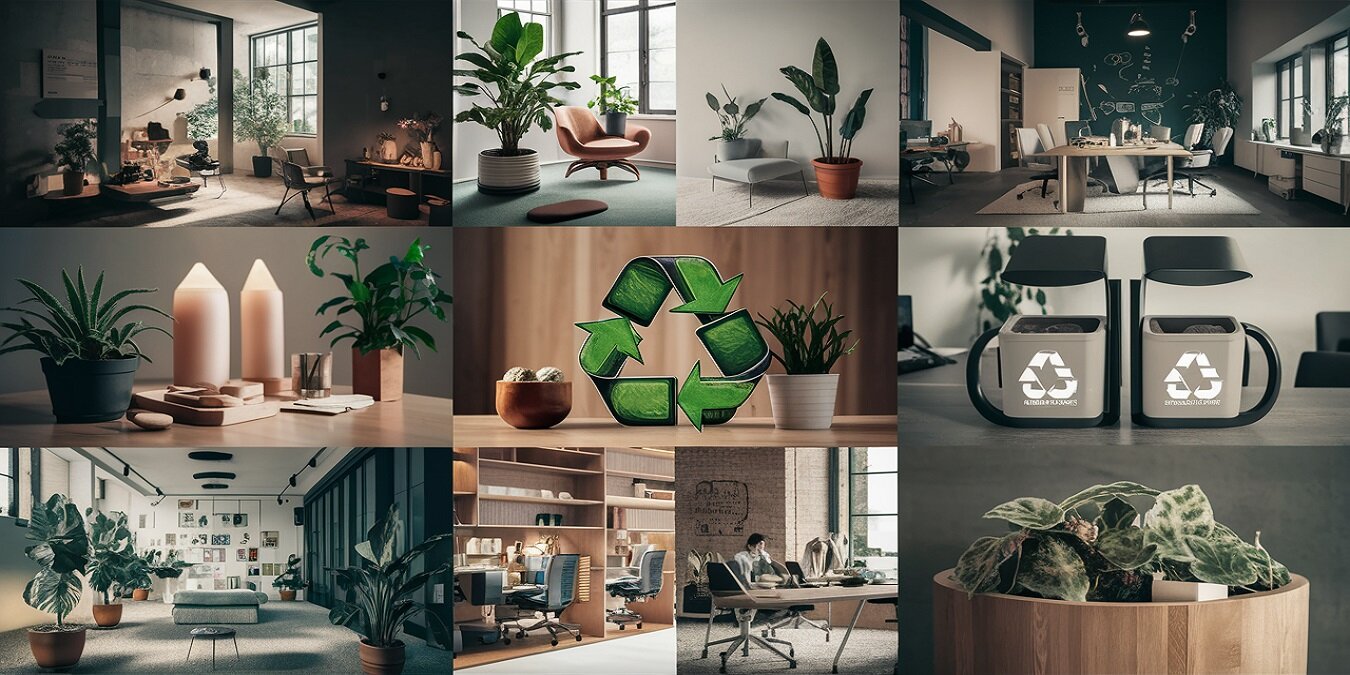
Building a Sustainable Office Space
In today’s world, businesses are increasingly recognizing the importance of sustainability, not only for the health of the planet but also for their bottom line. Creating a sustainable office space is an excellent way for US businesses to demonstrate their commitment to environmental responsibility while also benefiting from cost savings, improved employee morale and enhanced brand reputation.
This article explores practical and effective eco-friendly practices that businesses can implement to build a sustainable office space.
The Importance of Sustainable Office Spaces
Sustainability is more than just a buzzword; it represents a fundamental shift in how businesses operate. A sustainable office space can significantly reduce a company’s carbon footprint, conserve resources and promote a healthier work environment.
Additionally, sustainability initiatives can lead to financial savings through reduced energy and water consumption, lower waste disposal costs and potential tax incentives.
Benefits of a Sustainable Office Space
- Environmental Impact: By reducing energy consumption, waste and resource use, sustainable office practices help mitigate climate change and protect natural ecosystems.
- Cost Savings: Sustainable practices often lead to lower operating costs through energy efficiency, waste reduction and resource conservation.
- Employee Well-being: A sustainable office can improve indoor air quality, lighting and overall workplace environment, leading to healthier, happier and more productive employees.
- Brand Reputation: Demonstrating a commitment to sustainability can enhance a company’s reputation, attract environmentally conscious customers and build brand loyalty.
Eco-Friendly Practices for a Sustainable Office
-
Energy Efficiency
One of the most significant areas where businesses can make a difference is in their energy consumption. Implementing energy-efficient practices can significantly reduce a company’s carbon footprint and operating costs.
LED Lighting
Switching to LED lighting is a simple yet effective way to reduce energy consumption. LED bulbs use significantly less energy than traditional incandescent or fluorescent bulbs and have a longer lifespan, reducing the need for frequent replacements.
Smart Thermostats
Installing smart thermostats can help optimize heating and cooling systems, ensuring that energy is not wasted. These devices can learn occupancy patterns and adjust temperatures accordingly, providing comfort while minimizing energy use.
Energy-Efficient Appliances
Investing in energy-efficient appliances and office equipment can lead to substantial energy savings. Look for Energy Star-certified products, which meet stringent energy efficiency guidelines set by the Environmental Protection Agency (EPA).
-
Waste Reduction
Reducing waste is another crucial aspect of building a sustainable office space. Implementing recycling programs, reducing paper use and minimizing single-use items can make a significant impact.
Recycling Programs
Establishing comprehensive recycling programs for paper, plastics, metals and electronics can help divert waste from landfills. Ensure that recycling bins are clearly labeled and conveniently located throughout the office.
Paper Reduction
Encourage a paperless office by promoting digital documentation and communication. Use electronic signatures, cloud storage and digital collaboration tools to reduce the need for printed materials. When printing is necessary, use recycled paper and print double-sided.
Reusable Office Supplies
Replace single-use items with reusable alternatives. Provide employees with reusable water bottles, coffee mugs and utensils. Opt for refillable pens, rechargeable batteries and other sustainable office supplies.
-
Water Conservation
Water is a precious resource and conserving it is essential for sustainability. Implementing water-saving practices can reduce consumption and lower utility bills.
Low-Flow Fixtures
Install low-flow faucets, toilets and urinals in office restrooms to reduce water usage. These fixtures use significantly less water than traditional models without sacrificing performance.
Water-Efficient Landscaping
If your office has outdoor landscaping, choose drought-resistant plants and implement efficient irrigation systems. Consider using rain barrels to collect and reuse rainwater for watering plants.
-
Sustainable Office Design
The design and layout of your office space can play a significant role in promoting sustainability. Incorporate eco-friendly materials, natural lighting and ergonomic furniture to create a healthy and sustainable work environment.
Eco-Friendly Materials
Choose sustainable building materials such as reclaimed wood, bamboo and recycled metal for office furniture and finishes. Low-VOC (volatile organic compound) paints and adhesives can improve indoor air quality.
Natural Lighting
Maximize the use of natural light by designing open office spaces with large windows and skylights. Natural light not only reduces the need for artificial lighting but also improves employee mood and productivity.
Ergonomic Furniture
Invest in ergonomic furniture to promote employee health and well-being. Adjustable desks, chairs with proper lumbar support and keyboard trays can reduce the risk of musculoskeletal issues and enhance comfort.
-
Green Commuting
Encourage employees to adopt eco-friendly commuting options to reduce the environmental impact of daily travel.
Public Transportation and Carpooling
Promote the use of public transportation, carpooling and ridesharing among employees. Provide incentives such as subsidized transit passes, preferred parking for carpoolers and flexible work hours to accommodate different commuting schedules.
Bike-Friendly Amenities
Create a bike-friendly workplace by providing secure bike storage, shower facilities and changing rooms. Encourage employees to bike to work by offering incentives such as bike maintenance reimbursements or bike-to-work challenges.
-
Indoor Air Quality
Indoor air quality has a significant impact on employee health and productivity. Implementing practices to improve air quality can create a healthier and more comfortable work environment.
Air Purification
Invest in air purifiers and ventilation systems to reduce indoor air pollutants. Regularly maintain HVAC systems to ensure they operate efficiently and provide clean air.
Indoor Plants
Incorporate indoor plants to improve air quality and create a more pleasant office environment. Plants can help filter pollutants, increase humidity and reduce stress levels.
-
Green Certifications
Pursuing green certifications can validate your commitment to sustainability and provide a framework for continuous improvement.
LEED Certification
The Leadership in Energy and Environmental Design (LEED) certification is a globally recognized standard for green buildings. Achieving LEED certification demonstrates your commitment to sustainability and can enhance your company’s reputation.
B Corporation Certification
B Corporation certification recognizes businesses that meet high standards of social and environmental performance, accountability and transparency. Becoming a B Corp can help your company build credibility and attract socially conscious customers and employees.
-
Employee Engagement
Engaging employees in sustainability initiatives is crucial for their success. Foster a culture of sustainability by involving employees in decision-making and encouraging eco-friendly behaviors.
Green Teams
Form a green team or sustainability committee to lead and coordinate sustainability efforts within the office. Encourage employees to participate and contribute ideas for improving office sustainability.
Education and Training
Provide education and training on sustainability practices to raise awareness and inspire action. Offer workshops, seminars and resources on topics such as energy conservation, waste reduction and green commuting.
-
Sustainable Procurement
Adopting sustainable procurement practices ensures that the products and services your company uses align with your environmental values.
Eco-Friendly Suppliers
Choose suppliers and vendors that prioritize sustainability. Look for companies with green certifications, transparent supply chains and environmentally friendly products.
Sustainable Office Supplies
Purchase office supplies made from recycled or sustainable materials. Opt for biodegradable or compostable products whenever possible.
-
Technology and Innovation
Leveraging technology and innovation can drive sustainability efforts and enhance office efficiency.
Smart Office Technology
Implement smart office technology to optimize energy use, monitor resource consumption and improve operational efficiency. Smart lighting, thermostats and occupancy sensors can help reduce energy waste.
Remote Work
Embrace remote work options to reduce the environmental impact of commuting and office operations. Remote work can also enhance employee work-life balance and productivity.
Conclusion
Building a sustainable office space is not only beneficial for the environment but also for the overall success and well-being of your business. By implementing eco-friendly practices such as energy efficiency, waste reduction, water conservation, sustainable design and green commuting, businesses can create a healthier, more productive and more sustainable workplace.
Engaging employees, pursuing green certifications and adopting sustainable procurement practices further enhance these efforts. Embracing sustainability is a journey and every step taken contributes to a more sustainable and prosperous future for your business and the planet.
Creating a sustainable office space is a tangible way for US businesses to demonstrate their commitment to environmental responsibility while reaping the benefits of cost savings, improved employee morale and a stronger brand reputation.
Start making changes today and your business will be well on its way to building a sustainable and successful future.














